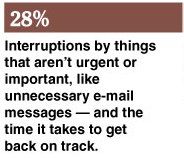Merlin’s weekly podcast with Dan Benjamin. We talk about creativity, independence, and making things you love.
NYT: Businesses Fight the Email Monster They Helped Create
Merlin Mann | Jun 14 2008
Lost in E-Mail, Tech Firms Face Self-Made Beast - NYTimes.com Is Information Overload a Billion Drag on the Economy? - Bits - Technology - New York Times Blog If you've seen the video of my Inbox Zero talk at Google, you may recall the moment when a few attendees start mentioning the hundreds of internal email messages they receive (and send) in a given day. I still remember, because I almost fainted. Whenever I hear these and similar stories, the same question always comes to mind: "What does a company get out of its employees spending half their day using an email program?" Well, apparently, it's a question a lot of people are starting to ask. Including Google. A story in today's New York Times covers Sili Valley's new interest in curbing unnecessary interruptions and helping stem the flow of endless data.
A few more stats for you:
I'd also draw your attention to this infographic illustrating data points from recent studies on "workers' efficiency at information-intensive businesses." 28% of a typical worker's day is spent on:
Sidenote: According to that same graphic, 20% of an average day is spent on meetings. Wow. Expressed as a year, that means a meeting you start on New Year's day would let out around the middle of March. Yikes. Sounds like these folks have their work cut out for them. I think it's important to clarify something here: there's nothing fundamentally wrong or irreparable about email as a tool. Given my position on how email gets (ab)used, you could be forgiven for thinking I want everyone to write each other letters once a year and ride cows to work. No. Not at all. My point has always been that, as with any tool, email can be used for good or ill depending on the problems you've decided it can solve. One trouble is that our use and widespread adoption of email hasn't brought with it an equally widely-adopted understanding about how to use it, what content it's appropriate for, and what expectations we accept regarding when it's allowed to take us away from everything in our life that's not email. There are very few shared rules of the road right now. And that's making life hard for a lot of people. I'm thrilled to hear that these ideas are bubbling up and getting the attention they deserve; email pain is usually a quiet, lonely, and shameful one, where people's work and home life suffer from the silent understanding that "too much is never enough" -- that trying to tamp down this always-on hysteria is a sign of weakness or sloth. That's ironic, given the biggest reason we reason use email so much: it's easy. There's no cashier, editor, or therapist through which your message must pass. You set your own rules for what's appropriate to send, ask, or demand. You decide what it means when someone reacts (or doesn't react) in a given manner or time frame. Email is still the Wild West, and companies are paying billions of dollars a year to supply the six-shooters and Stetsons. Yeehaw. I'll keep following these stories, because, I must tell you, I think it's going to be a rocky road for businesses to patch. Will whacky experiments like "No Email Fridays" have an affect on how we think about this medium? Only as much as "No Ice Cream Sundays" can help fix your eating disorder. But, I'm glad they're trying, and I'm really glad the conversation has started at a higher level. As for the decision-makers who are struggling with this stuff: these stats are great for getting companies off the bubble, but before you start breaking crockery, I suggest talking to lots of real employees about how they work, how they communicate, and how they might be able to help you. Every time I speak to a company, I hear half a dozen depressing stories of management disconnection and communication bedlam, alongside one or two completely inspiring tales about how employees and small teams are working to fix things at a squad or platoon level. It's really amazing, and I wish it were something C-levels and managers were more cognizant of. So, I suggest you be open to seeing email as just one tool among many, and be gracious about listening to those teams about how they've worked to fix or ameliorate these problems. Bottom line (and I'll never stop saying this): stop trying to eradicate human communication problems by introducing waves of new technology or made-up rules of social engineering. A company with email problems is also experiencing people problems. Until you understand why the wetware isn't working like you'd expected, don't go nuts with top-down technology solutions and over-clever edicts. There's a million tiny ways to improve how a business communicates with itself, and a lot of that intelligence is currently trapped, unmined, in the heads of people who've never been asked for an opinion. I like to think articles like this represent every knowledge worker's opportunity to raise his or her hand and say, "Hey, I have an idea." [NYT links via Mrs. Mann] 10 Comments
POSTED IN:
About MerlinBio Merlin Mann is an independent writer, speaker, and broadcaster. He’s best known for being the guy who created the website you’re reading right now. He lives in San Francisco, does lots of public speaking, and helps make cool things like You Look Nice Today, Back to Work, and Kung Fu Grippe. Also? He’s writing this book, he lives with this face, he suffers from this hair, he answers these questions, and he’s had this life. So far. Merlin’s favorite thing he’s written in the past few years is an essay entitled, “Cranking.” |
|
| EXPLORE 43Folders | THE GOOD STUFF |



